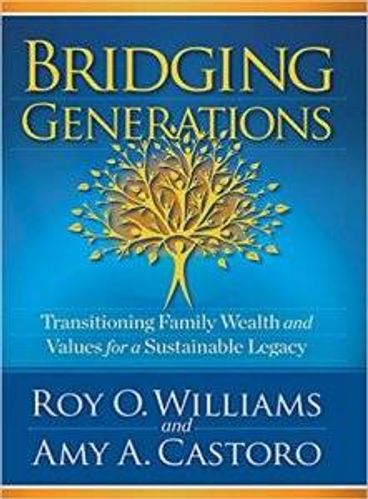How to Leave an Inheritance Without Causing Grief
A family wealth expert offers advice for parents
“I give them a $20,000 gift and I don’t get a thank you?” Sound familiar? The dollar amount may vary, but the frustration is the same. More and more people are frustrated and confounded at the lack of appreciation they experience when passing along their wealth to their children and grandchildren.

They worked hard for their money because they wanted to give their kids and grandkids a better life. But these generous people are realizing that their wealth is causing them more grief than gain.
At The Williams Group, a firm that works with families struggling with wealth transfer and its impact on the inheriting generation, we are often asked, “How do we leave our wealth to our kids and not cause more grief?”

What Parents Care About Most
In 2007, the Boston College Center on Wealth and Philanthropy embarked on an ambitious four-year study to explore the innermost hopes and struggles of wealthy people and how prosperity has shaped their lives. Participants were asked about the ways their money helps, or gets in the way of, their deepest aspirations for themselves and their children. The study revealed that participants with children worried less about making more money and impacting the world through philanthropy than “to be a good parent.”
If “to be a good parent” is paramount, then why kick the can of the money conversation down the road?
Most parents are reluctant to talk about money with their kids, and rightly so. It’s a daunting conversation, and invites the question: “How much inheritance can I expect?”
The High Failure Rate Among Affluent Families
But when parents leave their hopes and dreams to chance, the odds of a successful outcome do not bode well. Our 20-year study at The Williams Group revealed the reasons why there is a 70 percent failure rate among affluent families (meaning the assets dissipate and family relationships disintegrate):
- Mostly, it related to a family’s ability to have meaningful, productive and honest conversations about the impact of money and the purpose of the wealth.
- Some of it was due to the heirs’ relationship to wealth. For example, whether they had a direction in life, understood basic personal finance or knew their role in the estate plan once it transferred.
- The rest was attributed to the family not having a shared understanding of the purpose of the wealth. In other words: Did they see themselves as stewards or socialites? Did family values lead decisions related to the wealth? Was there alignment regarding how distributions were to be handled?
Wealth as a Weapon
Well-meaning parents often answer their children’s question of “how much and when?” by establishing a structure that does the protecting for them.
Their wealth is locked up in trusts or distributed to their kids at “age-appropriate milestones” or they employ a clause in the will that states “if there is any fighting, it all goes to charity.”
Mom and Dad will also try to protect the family values by threatening to disinherit those that don’t tow the family line — such as not having the same political affiliation or religious beliefs.
In our interpretation, this is a fairly short-sighted solution, although common. This takes care of Mom and Dad’s concerns, however the only unity among generations charged with executing that strategy will be pooling their resources to change the will.
Mixed Messages About Inheritances
Another strategy parents often employ is to leave the kids guessing. Here, Mom and Dad believe that if the kids don’t know there is significant wealth, they will remain motivated and work as if they are not going to get anything. The younger generation, however, is fairly savvy at extracting information through the Internet. So when we interview this generation, they almost always have figured out their parents’ net worth within a pretty close margin.
The pressure of the children not knowing what they will inherit starts to show up in awkward questions — wondering if they can ask for financial support or if they will be cut off. Some of our clients’ offspring refer to this as the “walk of shame,” meaning they live beyond their means in the homes their parents have purchased for them, enroll their kids in the private school their parents pay for, participate in the country club their parents insist on, and have to ask for supplemental income on a monthly basis.
Having ‘The Conversation’ Without Talking About Money
One of our clients, I’ll call him Mr. Fellows, grew up as one of eight children in a strong Irish Catholic family. They were not well off; Dad was a laborer and with so many mouths to feed, powdered milk was a staple. Hard work, focus, determination, and courage were the family values. Determined to give his own children a better life, he became one of the largest beer distributors in the United States and Canada. The outcome was not what he planned. His children only came to him when they wanted something; money became the vehicle for contact. His children lacked the motivation and direction he had and their lives were adrift. The dissonance in their relationships was increasing, the sense of unity was dissipating, and the sense of family was disintegrating.
At our first meeting, we invited the family members to speak candidly about their ideas for the purpose of the wealth and the contribution they could see themselves making. Toward the end of the first day, the youngest son had tears in his eyes. He said the honest exchange from his siblings was the first time he felt like he had a family.
If your family is at odds with each other over inheritances, take a moment and step back and ask a different question. Reset the context of the issue and strive for alignment on the purpose and intended outcome of the conversation.

